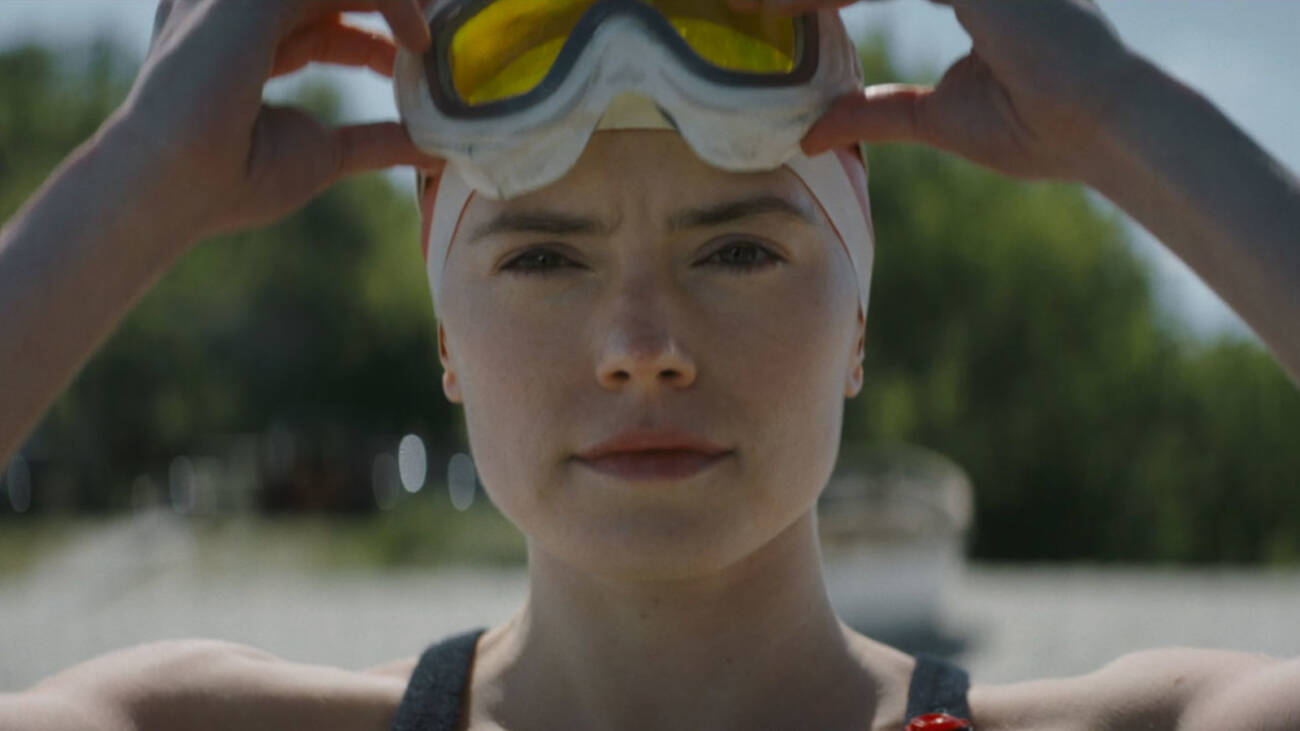It’s sad, but predictable. In a vacuum, Young Woman and the Sea, is old fashioned and sweet in all the good ways. 20ish years ago, this would have been a $50-75 million dollar moderate success and had a long DVD life. But Daisy Ridley ended up in the wrong place, wrong time, again. In a crusading film about pushing boundaries, the boundaries pushed back on this one, not only in the form of modern audience tastes, but also the studios releasing this like 3 months after a movie where an amazing, older woman traveled 3x the distance across a greater body of water. Poor Trudy feels more like her sister Meg in movie world, doesn’t she?
Oh right, you probably don’t know who Trudy Eberle (Daisy Ridley) or her sister Meg (Tilda Cobham-Hervey) are. They are daughters of German immigrant parents (Kim Bodina and Jeanette Hain) living in New York in the 1910s/1920s. Both become excellent swimmers, and their mother finds an underground women’s swimming group run by Charlotte (Sian Clifford) since women can’t swim in the big boy pools. While Meg does okay, Trudy blossoms, pushing herself to become one of the best swimmers in the US, representing the country in the 1924 Olympics. After that’s over, dad expects Trudy to fall in line like Meg, and get married off and have a bunch of babies. Trudy’s eyes have been opened though, and she’s now fixated on the English Channel.
An old fashioned period piece demands an old fashioned story. Young Woman and the Sea sticks to the tried and true sports movie formula. Young Trudy proves her moxie early, surviving the deadly measles and overcoming any obstacle put in her way, over and over again. But the most difficult opponent awaits: all men, and society in general. The patriarchy is the big bad here, putting Trudy in innumerable boxes, hoping she fails. The movie creates a straight up human manifestation in the form of drunken cesspool Jabez Wolffe (Christoper Eccleston), who spends the whole movie determined to end all of Trudy’s dreams. The film is best when he departs early, but the patriarchy shows how far and spread it can be, with various other characters standing in her way, including her own father and sister. And like every great sports hero, Trudy triumphs over them all (after all, Young Woman and the Sea was a book first), tapping into the deep reservoirs of her greatness to do the impossible, inspiring countless other young girls to break through their own glass ceilings to get to the life they want for themselves.
And yet, Trudy needs help to get to those goals. Much like how the patriarchy can manifest in various forms, so can progress. Each of the main characters except for the feces of humanity Jabez Wolffe acts both as barrier and guide for Trudy in her fated English Channel swim. Meg for example, falls into a depression realizing she’s been bypassed by her sister, and leaves her side to live in quiet misery. But watching Trudy accomplish all this amazing stuff eventually drags Meg out of her rut, and she becomes a vital contributor to Trudy’s triumph. Those crappy goggles Trudy wears become leaky, and only a seamstress and homemaker could improvise a way to close the leak with limited materials on a boat. This character flexibility gives Young Woman and the Sea some little exciting wrinkles as Trudy has to decipher who is on her side at that time, and maybe who has been spooked by societal pressure to stop her?
The moral of Young Woman and the Sea is pretty simple. If a sweet, badass woman needs you to coach her to do something no woman has ever done before, don’t be human herpes Jabez Wolffe. The dude is one of the most loathsome movie characters in some time, so much so that I was hoping for a violent, r rated death in this PG wholesome Disney sports drama for that bag of dicks. Excuse my language moms. I’ll go to my room.

